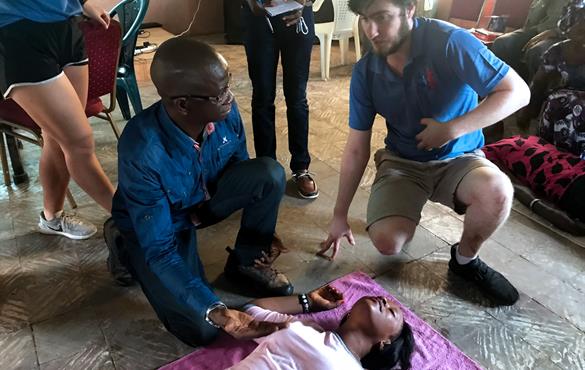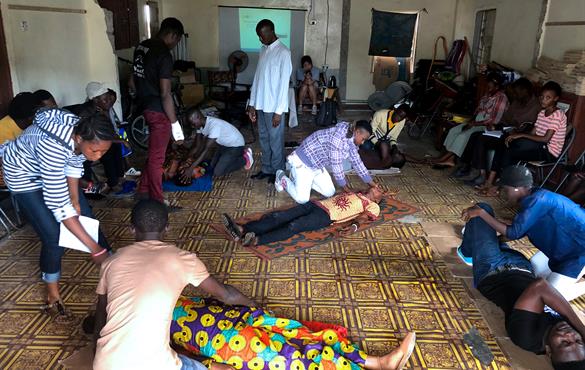Engineering student works to expand global emergency services
This past summer, Zach Eisner and his organization, LFR International, trained more than 1,000 first responders in Sierra Leone and helped lay the framework to train hundreds more

Zach Eisner, a junior majoring in biomedical engineering, spent the past summer in Sierra Leone helping to expand the emergency medical services (EMS) capabilities of the region. He shared more about his organization, LFR International, and the work he's doing to provide basic trauma care around the world.
Tell us about LFR International. Did you have previous experience working with first-response organizations?
I founded LFR International in 2018 with fellow WashU alumnus, Peter Delaney, who earned a degree in global health & environment in anthropology from the College of Arts & Sciences in 2018. Prior to that, I trained and served as an emergency medical technician and instructor. Peter brought his own experiences from a 2016 international EMS project in Uganda.
These experiences, along with my work in the nonprofit sector, allowed us to create an organization that would work to prevent thousands of deaths each year in low- and middle-income settings. LFR has grown incredibly over the past year and has expanded into four locations — Uganda, Chad, Guatemala and Sierra Leone — training more than 2,000 first responders and 50 trainers in emergency trauma care.
What were you able to accomplish in Sierra Leone?
I lead a team of three to implement the first phase of LFR International training in Bombali District, Sierra Leone. We trained 1,029 lay first responders in basic trauma care and 50 instructors, who have since trained hundreds more. I coordinated partnerships with the national Sierra Leone Red Cross Society and the Agency for Rural Community Transformation, among others, who have agreed to continue aiding with program implementation over the next five years.
From these partnerships, we created the First Responder Coalition of Sierra Leone (FRCSL), the only organization for EMS-capacity building in Africa. The FRCSL plans to train and equip 4,500 first responders before the end of 2019 and establish West Africa’s first formal emergency medical services school before the end of 2022.
LFR International is working with other members of the FRCSL and the Sierra Leonean parliament to pass the first Good Samaritan laws on the continent. I was also fortunate enough to meet with the former president of Sierra Leone, Ernest Bai Koroma, to discuss the future of EMS in Sierra Leone.

What was the most challenging part of the experience? How did you overcome it?
The most challenging part of my experience in Sierra Leone was adjusting to living in a different setting from what I had been used to. I was constantly reminded of the luxuries that we so often take for granted in the United States. Power was unreliable due to the rainy season, and water needed to be filtered by hand before drinking.
That said, the difficulties faded as the project progressed. After a month, I found myself better acquainted with the local language and customs. Making new friends definitely helped. I was able to laugh (and be laughed at) about the weather, the mosquitoes and the many other things I was experiencing for the first time.
How do you think this experience will help make you a better engineer?
Developing this program required me to think more like an engineer than ever before. Being an engineer in any setting requires an ability to problem solve and think critically, and I was challenged to apply those skills in Sierra Leone. I was confronted with several unique problems with scheduling and implementing trainings, overcoming financial barriers, as well as investigating the clinical implications of training first responders. I was forced to think outside the box in order to ensure the success of the program.
What is it important for students to take part in service or international experiences such as this?
Taking part in international service allows people in positions of privilege to provide aid to those who may be disadvantaged in a particular aspect of life. Immersing myself in an unfamiliar setting allowed me to appreciate aspects of a new culture that I would have been blind to had I not done service abroad. I recommend international service to anyone who is considering it and would love to talk about LFR International fellowship programs to those who are interested.



